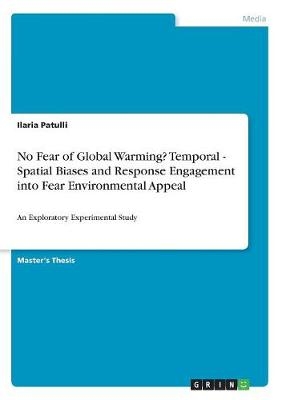
No Fear of Global Warming? Temporal - Spatial Biases and Response Engagement into Fear Environmental Appeal
An Exploratory Experimental Study
Seiten
2017
|
17001 A. 1. Auflage
GRIN Verlag
978-3-668-44170-5 (ISBN)
GRIN Verlag
978-3-668-44170-5 (ISBN)
- Titel nicht im Sortiment
- Artikel merken
Master's Thesis from the year 2013 in the subject Communications - Ethics in the Media, University of Amsterdam (Graduated School of Communication), language: English, abstract: This Master's Thesis explores Spatial and Temporal dimensions of psychological distance into fear environmental campaigns. In order to examine factors which may increase individual's engagement in climate change issue, different levels of spatial (Local - Global) and temporal (Near Future - Future) dimensions of psychological distance are analyzed into fear campaigns, using Witte's EPPM principles.In particular, it was supposed that individual's perceived vulnerability and perceived severity of the threat mediate this relationship. In the study, three main assumption were examined. The first one proposed that Local messages, compared to Global, were more effective in increasing individual's perceived vulnerability, and that this would increase individual's engagement with the climate issue. The second conjecture started with an inquisition concerning whether Local or Global message lead to more severity, assuming that the level of increased perceived severity would increase individual's engagement with climate change.The third hypothesis supposed that the use of a Near Future temporal representation, in comparison to a distant Future representation, was more effective in increasing individual's perceived vulnerability and severity, and this would lead to a higher engagement with the issue. An online experiment with a 2 (Space perspectives: Local - Global) x 2 (Time perspective: Near Future - Future) within subjects design, was performed in order to explore the effects of the different conditions on individual's perceived Vulnerability, Severity and Engagement.The overall analysis of the model revealed that only Vulnerability and Severity have a significant effect on the Engagement. Concerning Spatial and Temporal dimensions the analysis was not significant. Thus, Temporal and Spatial differences had no significant effects in influencing individual's perceived Vulnerability, Severity and Engagement. Limitations, suggestions and further conclusions are given in the final discussion.
| Erscheinungsdatum | 11.05.2017 |
|---|---|
| Sprache | englisch |
| Maße | 148 x 210 mm |
| Gewicht | 94 g |
| Themenwelt | Geisteswissenschaften ► Philosophie ► Allgemeines / Lexika |
| Sozialwissenschaften ► Kommunikation / Medien ► Allgemeines / Lexika | |
| Sozialwissenschaften ► Kommunikation / Medien ► Medienwissenschaft | |
| Schlagworte | appeal • biases • Engagement • environmental • Experimental • exploratory • fear • Global • Medienwissenschaften • response • Spatial • Study • temporal • Warming |
| ISBN-10 | 3-668-44170-7 / 3668441707 |
| ISBN-13 | 978-3-668-44170-5 / 9783668441705 |
| Zustand | Neuware |
| Haben Sie eine Frage zum Produkt? |
Mehr entdecken
aus dem Bereich
aus dem Bereich
die letzten Jahre der Philosophie und der Beginn einer neuen …
Buch | Hardcover (2024)
Klett-Cotta (Verlag)
28,00 €
Gesundheitsschutz, Selbstbestimmungsrechte, Rechtspolitik
Buch | Softcover (2024)
Kohlhammer (Verlag)
39,00 €
Jenseits von Identität | Ausgezeichnet mit dem Leipziger Buchpreis …
Buch | Softcover (2023)
Ullstein Taschenbuch Verlag
13,99 €


